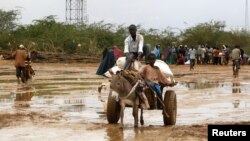LONDON —
The United Nations refugee agency (UNHCR) is working to improve sanitation conditions at the world’s largest refugee settlement in Kenya following an outbreak of jaundice. More than 200 cases of acute jaundice have been reported in the Dadaab refugee camps.
“We had actually four deaths. Those were actually mothers who had given birth," said UNHCR spokesperson Mans Nyberg, speaking to VOA from Dadaab.
The jaundice cases have been reported across all five camps in the refugee settlement, which is home to more than 400,000 people, most of them Somali.
Nyberg says he expects the number of reported jaundice cases to rise because there is a one month incubation period.
He says the outbreak has happened because of problems with sanitation. New arrivals have come in using poor hygiene, he says.
On top of that, the complex is overcrowded and the infrastructure is strained.
The Dadaab camps are located in Kenya less than 160 kilometers from the border with Somalia. Last year, around 130,000 refugees arrived from Somalia in the space of a few weeks, fleeing severe drought and famine.
Nyberg says it’s been difficult to keep pace with the expanding population. “The sanitation situation in some areas of the camps is quite bad and latrines are overflowing and people are defecating in the open, and so on,” he said.
He says in order to resolve the situation, UNHCR is bringing in thousands of new latrines and working to raise awareness about the importance of hand-washing, use of latrines, food and water hygiene.
UNHCR says health workers are also being trained to make active searches for new jaundice cases.
Meanwhile Kenyan authorities have reported some 80 cases of cholera in North Eastern Province, 18 of them in Dadaab camps. A cholera isolation ward has been opened at one camp hospital. Nyberg says right now the situation is under control.
“Of course, it is a serious situation," he said. "But we have 18 cases so far and we are absolutely in the position to deal with 100 cases so it is not an emergency - yet.”
There have been no reported cholera deaths at Dadaab so far.
UNHCR says it is concerned that waterborne diseases could spread when the rainy season begins in October and November.
“We had actually four deaths. Those were actually mothers who had given birth," said UNHCR spokesperson Mans Nyberg, speaking to VOA from Dadaab.
The jaundice cases have been reported across all five camps in the refugee settlement, which is home to more than 400,000 people, most of them Somali.
Nyberg says he expects the number of reported jaundice cases to rise because there is a one month incubation period.
He says the outbreak has happened because of problems with sanitation. New arrivals have come in using poor hygiene, he says.
On top of that, the complex is overcrowded and the infrastructure is strained.
The Dadaab camps are located in Kenya less than 160 kilometers from the border with Somalia. Last year, around 130,000 refugees arrived from Somalia in the space of a few weeks, fleeing severe drought and famine.
Nyberg says it’s been difficult to keep pace with the expanding population. “The sanitation situation in some areas of the camps is quite bad and latrines are overflowing and people are defecating in the open, and so on,” he said.
He says in order to resolve the situation, UNHCR is bringing in thousands of new latrines and working to raise awareness about the importance of hand-washing, use of latrines, food and water hygiene.
UNHCR says health workers are also being trained to make active searches for new jaundice cases.
Meanwhile Kenyan authorities have reported some 80 cases of cholera in North Eastern Province, 18 of them in Dadaab camps. A cholera isolation ward has been opened at one camp hospital. Nyberg says right now the situation is under control.
“Of course, it is a serious situation," he said. "But we have 18 cases so far and we are absolutely in the position to deal with 100 cases so it is not an emergency - yet.”
There have been no reported cholera deaths at Dadaab so far.
UNHCR says it is concerned that waterborne diseases could spread when the rainy season begins in October and November.




